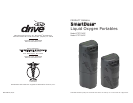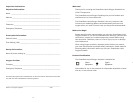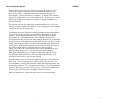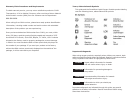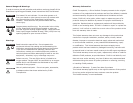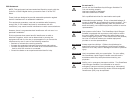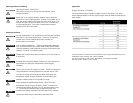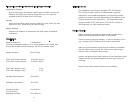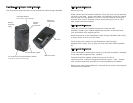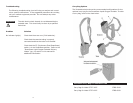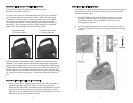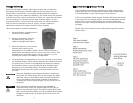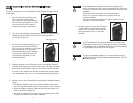
520
Do not use if. . .
Do not use the SmartDose Liquid Oxygen Portable if it:
It is not working properly.
Has been dropped or damaged.
Has been submersed in water.
Call a qualified technician for examination and repair.
Unintended oxygen leakage. If any unintended leakage of
oxygen is detected, do not attempt to use the product. Turn
the product off. If leakage persists, place the product out
doors and
notify your medical equipment provider or service
representative.
Over pressure relief valve. The SmartDose Liquid Oxygen
Portable is equipped with a pressure relief valve to ensure
the user’s safety. When activated, this safety feature may
make a slight hissing noise. If this noise occurs and persists,
turn the unit off and contact your medical equipment
provider or service representative.
Alway
s supervise children. Children should always be
supervised around the SmartDose Liquid Oxygen Portable.
Failure to do so may result in damage to the unit or personal
injury.
Use in accordance with your prescription. For your safety,
the SmartDose Liquid Oxygen Portable must be used in
accordance with the prescription determined by your
physician.
Not for use in emergency transport vehicles. The Sma
rtDose
Liquid Oxygen Portable is not intended to be used in
emergency transport vehicles (ambulances or helicopters),
or other similar areas where high levels of Electromagnetic
Interference (EMI) may be expected.
WARNING
WARNING
WARNING
WARNING
WARNING
WARNING
FCC Statement
NOTE: This equipment has been tested and found to comply with the
limits for a Class B digital device, pursuant to Part 15 of the FCC
Rules.
These limits are designed to provide reasonable protection against
harmful interference in a residential installation.
This equipment generates, uses and can radiate radio frequency
energy and, if not installed and used in accordance with th
e
instructions, may cause harmful interference to radio communications.
However, there is no guarantee that interference will not occur in a
particular installation.
If this equipment does cause harmful interference to radio or
television reception, which can be determined by turning the
equipment off and on, the user is encouraged to try to correct the
interference by one or more of the following me
asures:
-- Reorient or relocate the receiving antenna.
-- Increase the separation between the equipment and receiver.
-- Connect the equipment into an outlet on a circuit different from
that to which the receiver is connected.
-- Consult the dealer or an experienced technician for help.



